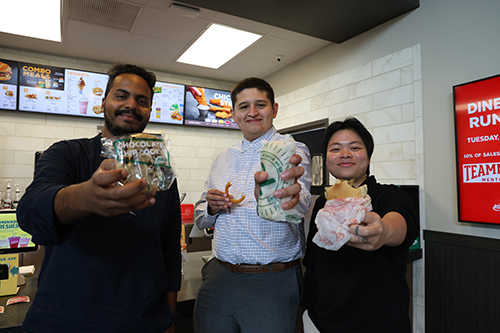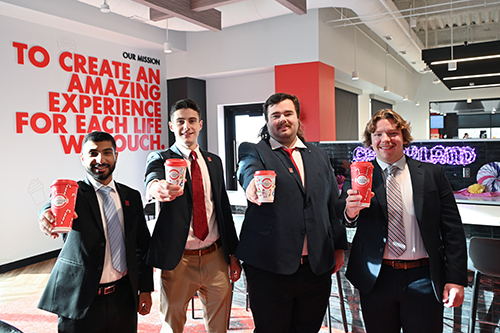Before graduating, supply chain management majors at the University of Nebraska–Lincoln gain hands-on experience through Strategic Supply Chain Management (SCMA 474), a semester-long capstone course. This fall, students partnered with Runza Restaurants® and Scooter’s Coffee® to tackle real-world business challenges and present recommendations to company leaders.
“The capstone experience is a crucial part of the degree program. It provides a collaborative project essential for professional growth before students graduate and enter the workforce,” said Esma Gel, Cynthia Hardin Milligan Chair of Business and professor of supply chain management and analytics, who teaches the course. “These projects are data-intensive and real-life, enhancing students' skills in data analysis, problem-solving, communication and presentation.”
Runza: Exploring an In-House Distribution System
 Deya Mohamed, Jerry Armstrong and Phuong Nguyen visited a Lincoln Runza restaurant with company leadership to get a better understanding of how much inventory each restaurant could hold.
Deya Mohamed, Jerry Armstrong and Phuong Nguyen visited a Lincoln Runza restaurant with company leadership to get a better understanding of how much inventory each restaurant could hold.
Seniors Jerry Armstrong of Waukegan, Illinois; Deya Mohamed of Khartoum, Sudan; and Phuong Nguyen of Haiphong, Vietnam, examined whether Runza should implement its own distribution system and considered the financial implications. Their analysis used five years of data and focused on two commonly ordered supplies: cups and lids.
“Beyond evaluating an in-house distribution system, we presented a route design with truck routes, a schedule and a statistical cost estimate,” Mohamed said. “We used Oracle Crystal Ball software to assess the cost of moving distribution in-house.”
The students presented their findings to Runza’s purchasing director, Dawn Amend, '89, and executive chef and supply chain leader Chris Zeeb. Both Runza leaders worked closely with the team throughout the semester.
“I wish I had more of this when I was a student at Nebraska. You're just not going to get something like this in a textbook,” Amend said. “It's important for a local business like us, with a unique story, to share and mentor.”
The students visited a local Runza restaurant to gain firsthand insights into its operations, learning about the family business and even trying their hand at making Runzas.
“It was important to see the size of the restaurants and that they can hold a lot of inventory. We also learned how some stores act as mini-fulfillment centers for nearby stores,” said Mohamed. “Spending time in the store made us more attached to the project. We wanted to do our best for them.”
Scooter's Coffee: Optimizing Inventory Management
 After successfully presenting their recommendations to Scooter's Coffee, Majid Al Harthy, Alessandro Boykin, Caden Vetter and Sam Pribyl sampled some of the beverages and met the company's CEO.
After successfully presenting their recommendations to Scooter's Coffee, Majid Al Harthy, Alessandro Boykin, Caden Vetter and Sam Pribyl sampled some of the beverages and met the company's CEO.
Another student team analyzed inventory management for Scooter’s Coffee, focusing on the replenishment of 24-ounce cups in its distribution centers in Dallas and Omaha. The team included seniors Majid Al Harthy of Muscat, Oman; Alessandro Boykin of Bedford, Texas; Sam Pribyl of Papillion, Nebraska; and Caden Vetter of Kearney, Nebraska.
“We used Tableau for data visualization and Python to analyze demand data. We used our analysis to obtain a statistical characterization of demand during the lead time to determine the best inventory level to provide the desired service levels,” said Boykin. “We also used some AI tools that completed in two minutes what would have taken us hours to process manually.”
The team created a continuous review inventory management model for the company and suggested strategies such as consolidating distribution centers.
“Our plan analyzed historical sales and purchase orders to develop an inventory replenishment model. Future iterations could include additional inputs like holding costs and purchase costs for greater accuracy,” said Pribyl.
Scooter’s leaders praised the students for their innovation and readiness for the workforce.
“They asked pointed questions and presented thoughtful solutions,” said Tara Wilburn, senior director of supply chain optimization. “Their use of industry standards and AI to enhance efficiency was impressive. They’re ready to hit the ground running in their careers.”
Expanding Capstone Class to Business Analytics Majors
Students who choose the new business analytics major will also progress into this capstone course with the supply chain management majors. Gel noted how this will reflect the interdisciplinary nature of professional work.
“Integrating business analytics and supply chain majors in the same teams mirrors real-world dynamics,” Gel said. “Graduates from these programs often collaborate on solving various business problems, such as supply chain, manufacturing and logistics issues, using analytics.”
Gel emphasized the importance of partnerships with local businesses, which have included Boss Truck Shops, Conagra Brands, Crete Carrier, Fastenal, Speedway Motors, Spreetail, US Xpress and Werner Enterprises, in addition to Runza Restaurants and Scooter’s Coffee.
“This year, we partnered with 10 companies, and I'm thankful for all of them. Their mentorship is vital for our students’ growth as professionals and a tremendous service to our university and community,” Gel said.
Published: January 14, 2025